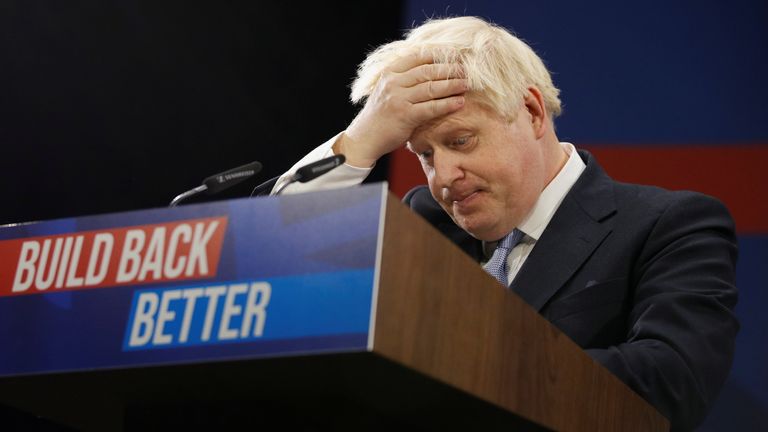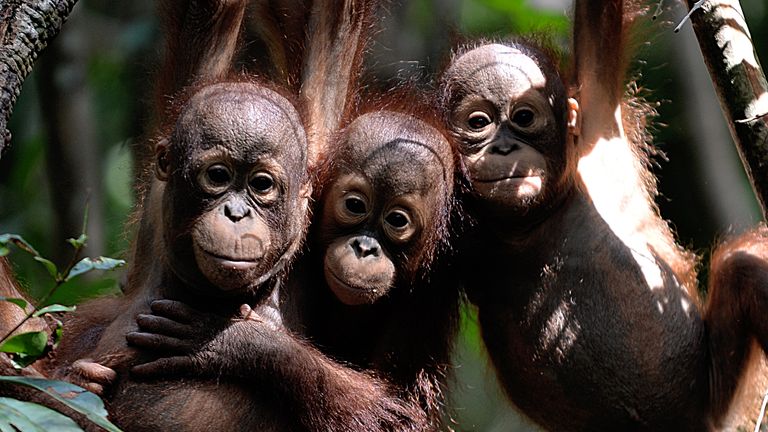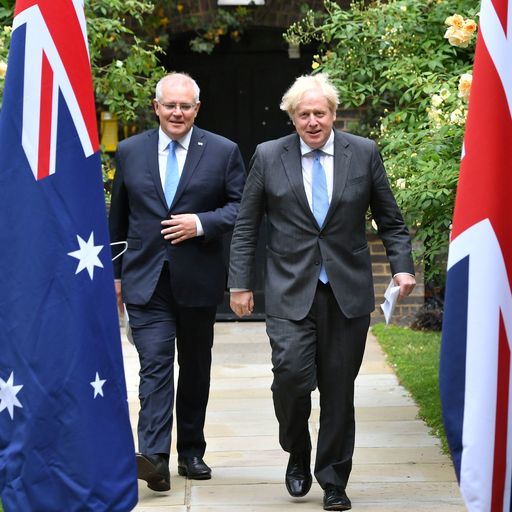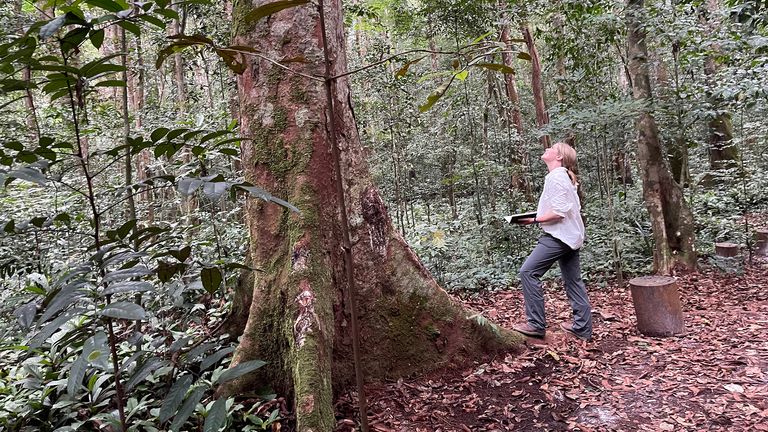UK trade deals should prioritise economy over environment – leaked govt document
Britain should prioritise economic growth over environmental protections in trade deals, according to a leaked government document obtained by Sky News.
Environmental safeguards should also not be treated as a red line when other countries demand they are broken in trade agreements, according to the paper drawn up by officials in the Department for International Trade (DIT).
The paper, which has not been seen or approved by cabinet, was drawn up for a cross-Whitehall working group and circulated around 120 Whitehall officials in recent days.
The text reflects the approach already adopted in some trade deals, but the timing of this appearing in black and white so close to the COP26 climate change summit is likely to embarrass civil servants.
Boris Johnson has previously boasted about Britain’s higher environmental standards than other countries, but there are fears these may be watered down or “liberalised” as a condition of giving countries like Australia and Brazil access to UK markets to sell their goods.
The leaked document says: “HMG (the government) should not refuse to liberalise on products of environmental concern where there is an economic case for liberalisation, or partner interest is so strong that not doing so would compromise the wider agreement.
“In these cases, we should continue to liberalise and address carbon leakage risk (in general, as well as any marginal additional risk from the FTA) using those FTA levers outlined in this note and non-FTA levers outlined elsewhere.”
Campaigners say this could mean goods entering the UK market could be linked to rainforest deforestation, very high levels of emissions or chemicals that would be banned here but are allowed in other countries such as palm oil from rainforest sanctuaries in Indonesia.
The leaked document continues: “HMG should not pursue a conditional liberalisation approach. This is due to the very high negotiability challenge (little precedent and proven difficulty of raising with partners on related issues) and WTO compliance issues/creating double standards with trade partners.”
The Department for International Trade is pursuing trade talks with the Brazilian government despite Amazonian destruction, when some suggest ending deforestation should be a condition of the trade deal.
The trade department played down the significance of the document leaked to Sky News.
A Department for International Trade spokesman said: “This is not government policy, and is not being considered by ministers.”
However, the spokesman declined to say they would protect against “products of environmental concern” entering the country because of trade deals. Nor would they comment on suggestions that the document reflected the practice already adopted by DIT.
Labour shadow trade secretary Emily Thornberry told Sky News: “It’s really shocking to see a document going round government where they’re essentially saying, ‘never mind about climate change, never mind about the environment, Bolsonaro is a difficult guy, if you want a trade deal from Brazil, and he wants to sell us stuff from a rainforest, we probably shouldn’t get in the way that much because otherwise we won’t end up with a trade deal’ – really?”
David Henig, director of the UK Trade Policy Project and a former official in DIT, said the approach in the document leaked to Sky News was a mistake but not a surprise as it reflected existing practice.
“The significance is, the UK government is saying, ‘economic growth first, climate change some way behind’, it is also saying ‘we’re not that confident that we can get this trade deal without abandoning climate change objectives and if need be, we will abandon those if that is required to get the trade deal’,” he said.
“I think it’s a mistake.
“We should be more confident in saying, we should get economic growth from trade AND we can tackle climate change.
“I don’t think it is a surprise that the UK government is prioritising trade deals and the economy over climate change, I think the surprise is they feel they need to do it so much they don’t feel they can bring together trade deals, the economy and climate change.
“I think there’s a lot of specialists that say, actually not only can you do that, you must do that as part of the fight against climate change.”
Bernice Lee, a trade analyst at Chatham House, said: “Trade deals can be a powerful tool in securing the twin goals of economic and environmental outcomes that are good for Britain.
“Why rule out an approach that links market access to progress on climate change and protection of forests when it’s one of the most important tools the UK can use to influence big economies in the run up to the COP26 summit and beyond?”
Sam Lowe, trade expert from the Centre for European Reform, added: “While there have been increased calls for the UK to make its foreign trade agreements (FTAs) conditional on partner countries meeting stringent environmental and climate targets, this confirms that such an approach has been deemed too tricky by DIT.
“It also clarifies that the UK is willing to liberalise trade in environmentally questionable goods if necessary to get an FTA over the line.
“I’m not sure any of this is surprising, but it does provide insight into where environment sits as a government priority vis-a-vis its FTA agenda.”
Kierra Box, a trade expert from Friends of the Earth, said the impact of this approach could be huge.
“It might be something like a product that’s produced in a way with hugely high carbon impacts, which we could produce in much more environmentally friendly ways within this country or get from elsewhere,” she said.
“Or it might be something like palm oil or soy or meat, which we source from areas that have been deforested, so we’re talking about products which are responsible for decline in our rainforest, pollution in our oceans, and the huge impacts on climate change – these are things we should be ruling out of trade deals, not ruling in.”







